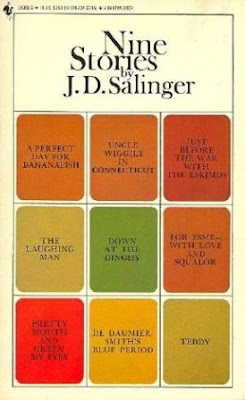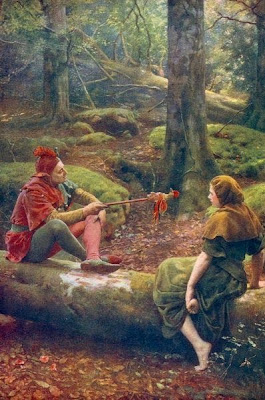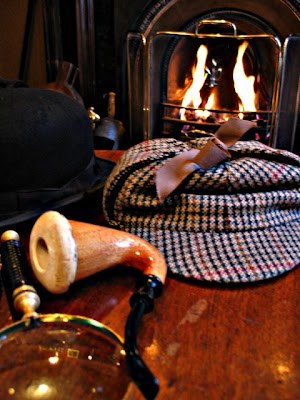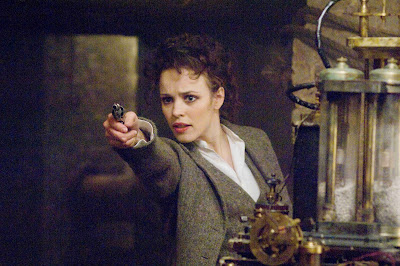
I was going to write something, but ten seconds after I started typing, Salinger rose up from the grave, hired a bunch of lawyers, and sued me.
Persons attempting to find a motive will be prosecuted; persons attempting to find a moral will be banished; persons attempting to find a plot will be shot.
The white noise of your breathing falls like snow
And swirls up to my smile, drifting and heaping.
I feel your heartbeat everywhere I go:
It's fierce and peaceful,like a goddess sleeping.
Your wind bites like a hundred thousand knives.
I meet each slice as if it were a kiss:
Promising love in neon-dappled dives,
Keeping me distant with your tiger's hiss.
You shred me like the legs of the Rockettes;
I want to eat you like Red Devil Cake.
You fill me up with yearning and regrets;
I need you like the vampire needs the stake.
My terrible desire, vicious and pretty --
My harsh and tender love -- my soul -- my city.I know I cannot chain you by my side.
I know you need more loves than mine to live.
I know we'll never be husband and bride:
Your Take is king, and beggar is my Give.
I know you have to feed your appetites --
You're on the town with pearls and a chignon.
I know the way you like to spend your nights:
You're drinks till 3 and after-hours till dawn.
You're seeing shows with tourists in Times Square.
You're Sunday brunch and afterwards the Met.
You're sipping kir royale at the Pierre.
You're cocktails in a Slipper Room banquette.
I know, too, even though you love to roam,
That, when I wake up, you'll always be home.I wake up and you’re home, but when I reach
To hold you closer, I grab empty space.
You’ve vanished like a wave does on the beach,
Drawn back into the city’s deep embrace.
You splash my face with hope and disappear;
You touch, then drift away like luck and fame.
You say, “What will I do with you, my dear?”
Then whisper everything except my name.
My love, I know you treat your loves alike:
You keep them distant every time you kiss,
Say no to Mark, and then stroll off with Mike,
And then swing back like nothing is amiss.
But I know this with total certainty:
You will be different when it comes to me.You never come to me -- I go to you,
And always find you in fast company:
Cabbing from the passé to some debut,
Ditching Group A for up-to-date Group B.
You’re always in the swim, so I must try
To win Olympic gold just to keep up --
Only the next chic place will satisfy;
The au courant alone will share your cup.
But in the end you’ll leave us all behind
And find a fresh crowd at the latest spot,
And we will envy them but be resigned,
For everything grows cold that once was hot:
No matter where we stand or who we’ve been,
We’re always on the outside looking in.I hate it that you’re never there with me
At spots I can’t afford; it hurts like sin
To see you as some moneybag’s jeune fille,
Like you’re first prize and Rich Boy cries “I win!”
While he throws me a look that screams: “You lose!”
And by his rules? I have and always will.
I can’t compete with him; you’ll always choose
Suites over sweet and T-bills over Bill –-
At least when you’re with him. When you’re with me,
It’s places he would not be caught in dead.
His rooftops and my dives lack alchemy:
His silver will not marry with my lead.
He dazzles you with gold, and cannot see:
In your eyes, even lead is currency.Some nights you stare at me as if I were
Metal too soft to meddle with, and say,
“Let’s take a rain check on the massacre.
We’ll do some mischief, dear, some other day.”
And some nights you can see I’m fit to fly
And hale enough to hazard life and limb,
And so you gentle me into the sky
Where I will wheel and hover at your whim.
And some nights you’re the one who’s weak and needy –-
Who trembles like a fawn that’s terrified --
Who looks at me like Dunaway to Beatty
Before the bullets end Bonnie and Clyde:
A world-without-end look, as if to say,
“Come, paltry death -- we two have lived today.”"Do this," you urge, and how can I refuse?
You know I crave whatever you can give.
Just lead the way and I will go, my muse.
You are the opium I need to live.
We two will share such highs that all the lows
Will feel like small inconsequential bumps.
We’ll chase the dragon wherever it goes,
Your smile the height that lifts me from the dumps.
You are my queen: command me anything.
I am your puppet speaking with your voice.
You are the balm that cools my suffering.
You are the road and I am your Rolls Royce.
Lead and I’ll follow; feed me and I’ll chew.
I’m nothing till you tell me what to do.And when I’m drunk with you and all the world
Shouts answers to my every silent prayer,
And hope is king, and life’s an oyster pearled,
And every street I walk is bold and rare,
There’s nothing you can play that I can’t sing --
Nothing you want that I cannot supply --
Nowhere I go where I won’t be the king --
Nobody else alive but you and I.
We’ll laugh at jokes that no one else will get
(And I will grab your hand and draw you near),
Pick random numbers and win every bet
(And you will stick your tongue into my ear),
And I will eat life up from lips to legs
And drink it till I drain death to the dregs.And when I wake up, everything is pain.
I blink my eyes and feel my face explode.
My skull is home to cactus spines, not brain.
My mouth tastes like the inside of a toad.
I shake with drumbeats like twelve time bombs ticking.
(What is that sound? Wait -- it’s my cells dividing.)
Some stallion in my gut just won’t stop kicking.
(Oh God -- that’s all my molecules colliding.)
This is what happens every time we play --
For every late night laugh, two days of groans.
The bill comes due and I will always pay
A price that troubles me down to my bones
And swear you off for good, till you ask “When?”
And I say, “Now,” and pay the price again.I hear your song calling me from outside
My bedroom window, and I scorn to sleep.
There are no dreamy airs that can abide
Comparison to tunes we two will keep --
No fantasies to equal how the real
Will rapture us as we reel out the night --
No might-have-beens to dog us at the heel --
No burning maybes yearning to ignite.
Those are the promises I hear in your
Quick whisper as I’m wrapped up in my sheets --
Today, tonight, tomorrow: I will soar
And you will swing me high above your streets
And beckon for a stare with ginger eyes
And gershwin me with clamor till I rise.The winter makes you sullen, gray and cold --
You’re dark and dreary almost all the time.
Your bitterness is keen and uncontrolled;
Your winds are raw and vicious, like a crime.
You greet the sunshine with a frigid hate
That like Medusa stares the world to stone.
Your fingers are like whips that flagellate,
Lancing through flesh and muscle to the bone.
Only the snow can scarf your biting edge --
It muffles your complaints beneath a quilt
That blankets skyscrapers into a hedge,
Softening stings like good deeds soften guilt,
Till all your coldness, anger, distance, spite,
Are hushed away in kissing drifts of white.The things I have to do to be with you
Are like slow poison to my soul and heart:
I have to smile at those I’d rather sue,
Bow to the stupid as if they were smart,
Nod with respect to those who irritate,
Saying, “Yes, please,” and not an expletive --
Profess to love what I confess I hate,
All for the salary that lets me live
With you -- a life where something in me dies
Each time my conscience with my wallet quarrels
And I embrace a fiscal compromise
By banking paychecks that bankrupt my morals:
Kingdoming devils in a daily hell
To woo the angel that I love so well.You are what I give thanks for on Thanksgiving:
The meal so rich it makes my table groan,
The waking breath that whispers I’m still living
And says, while you’re on earth, I’m not alone.
You are my Christmas Day, and like a toy
I wished for but I never thought I’d get,
The sight of you turns my despair to joy
The way good deeds make treasure out of debt.
You are my New Year’s Eve, my Times Square crowds --
The endless now, caught between then and soon,
Bright as a star that spears through sullen clouds,
Rare as an eclipse of a full blue moon.
And you’re my New Year’s Day, when Time’s wild spin
Is halted by your hopeful cry: “Begin.”
Copyright 2009, 2010 Matthew J Wells
There is no mercy in you -- there is just
The teasing smile that hides the butcher knife.
There’s nothing in your ways that I can trust;
No street that’s not a threat against my life.
One night you’ll say “Hello, there!” with a gun.
One day I’ll tease you and you’ll have my head.
One wrong step and my walking days are done.
One hint of weakness and you’ll cut me dead.
The price I pay for loving you is hard:
I need to grow a second pair of eyes
To see behind me and keep up my guard,
And extra ears to listen for your lies,
And extra hope, that when you start to tear me
Limb from devoted limb, you’ll smile and spare me.






You are what I give thanks for on Thanksgiving:
The meal so rich it makes my table groan,
The waking breath that whispers I’m still living
And says, while you’re on earth, I’m not alone.
You are my Christmas Day, and like a toy
I wished for but I never thought I’d get,
The sight of you turns my despair to joy
The way good deeds make treasure out of debt.
You are my New Year’s Eve, my Times Square crowds --
The endless now, caught between then and soon,
Bright as a star that spears through sullen clouds,
Rare as an eclipse of a full blue moon.
And you’re my New Year’s Day, when Time’s wild spin
Is halted by your hopeful cry: “Begin.”
 The plot. Plotwise, the movie is totally consistent with the Conan Doyle stories, which always set up a head-scratchingly-unexplainable mystery that Holmes can recognize and ultimately explain by revealing the significance of seemingly insignificant facts. This is done very well throughout the movie; when you see a crime scene through Downey’s eyes, you get (a) the oddity, (b) Downey’s mental impression of what caused the oddity, and (c) his investigation of the oddity, usually involving touching, tasting, or licking. There is also a marvelous little moment in a restaurant, where Downey is two things for the first and only time in the movie: alone, and in a public place. In those few moments, he’s aware of every conversation and every action around him to a terrifying degree, and you get a brief but real sense of what it must be like to be gifted (or cursed) with a vaccuum cleaner for a brain.
The plot. Plotwise, the movie is totally consistent with the Conan Doyle stories, which always set up a head-scratchingly-unexplainable mystery that Holmes can recognize and ultimately explain by revealing the significance of seemingly insignificant facts. This is done very well throughout the movie; when you see a crime scene through Downey’s eyes, you get (a) the oddity, (b) Downey’s mental impression of what caused the oddity, and (c) his investigation of the oddity, usually involving touching, tasting, or licking. There is also a marvelous little moment in a restaurant, where Downey is two things for the first and only time in the movie: alone, and in a public place. In those few moments, he’s aware of every conversation and every action around him to a terrifying degree, and you get a brief but real sense of what it must be like to be gifted (or cursed) with a vaccuum cleaner for a brain. Holmes and Watson. The underlying tension between this movie’s detective and doctor goes back to Gunga Din, where Cary Grant and Victor McLaglen will do anything to derail Douglas Fairbanks Jr’s imminent marriage to Joan Fontaine. Downey tries to do the same thing to Law and Kelly Reilly, but I sensed a recognition on Reilly’s part that this adventuring is one of the things that attracts her to the man she’s marrying, making the potential conflict so negligible that it feels tacked on, like some producer somewhere said, “But wait! We can’t just have them be friends! We have to show the friendship being threatened! That's more dramatic!” Sorry, that’s not Holmes and Watson; and it’s not Watson and his wives, either, none of whom ever stood in his way when a case with Holmes beckoned.
Holmes and Watson. The underlying tension between this movie’s detective and doctor goes back to Gunga Din, where Cary Grant and Victor McLaglen will do anything to derail Douglas Fairbanks Jr’s imminent marriage to Joan Fontaine. Downey tries to do the same thing to Law and Kelly Reilly, but I sensed a recognition on Reilly’s part that this adventuring is one of the things that attracts her to the man she’s marrying, making the potential conflict so negligible that it feels tacked on, like some producer somewhere said, “But wait! We can’t just have them be friends! We have to show the friendship being threatened! That's more dramatic!” Sorry, that’s not Holmes and Watson; and it’s not Watson and his wives, either, none of whom ever stood in his way when a case with Holmes beckoned. The Great Detective. Downey’s Holmes is one hell of a damaged human being, which is only something you see in flashes from other actors (with the exception of Jeremy Brett, who has the unnerving ability to switch from friend and companion to The Brain From Another Planet every time someone within earshot makes a thoughtless remark). But Downey's Holmes is not totally useless from the neck down; he’s also very physical, a quality which is mentioned in the Conan Doyle stories but never shown as much as, say, Holmes’ ability to disguise himself so well that even Watson doesn’t recognize him. The brains-and-brawn duality is set up right from the start in (comic-book-geek alert) two Midnighter-like segments where Downey predicts the course of a fight in slow-motion and then executes the prediction in real time. Why? Because that’s what he does; because he can’t help himself. Ask him to be honest and your fiancée will end up throwing a glass of wine in his face. Give him nothing to mentally wrestle with and he’ll resort to cocaine just to stimulate his brain. (But not in this movie; although God knows it fits the way Downey plays the character.) This Holmes is four chess moves ahead of everybody, he’s playing 20 people at once, and he’s as a wacky as a room full of Bobby Fischers. And Downey makes him downright likable.
The Great Detective. Downey’s Holmes is one hell of a damaged human being, which is only something you see in flashes from other actors (with the exception of Jeremy Brett, who has the unnerving ability to switch from friend and companion to The Brain From Another Planet every time someone within earshot makes a thoughtless remark). But Downey's Holmes is not totally useless from the neck down; he’s also very physical, a quality which is mentioned in the Conan Doyle stories but never shown as much as, say, Holmes’ ability to disguise himself so well that even Watson doesn’t recognize him. The brains-and-brawn duality is set up right from the start in (comic-book-geek alert) two Midnighter-like segments where Downey predicts the course of a fight in slow-motion and then executes the prediction in real time. Why? Because that’s what he does; because he can’t help himself. Ask him to be honest and your fiancée will end up throwing a glass of wine in his face. Give him nothing to mentally wrestle with and he’ll resort to cocaine just to stimulate his brain. (But not in this movie; although God knows it fits the way Downey plays the character.) This Holmes is four chess moves ahead of everybody, he’s playing 20 people at once, and he’s as a wacky as a room full of Bobby Fischers. And Downey makes him downright likable. Irene Adler. If Downey is Batman then Irena Adler is Catwoman, somebody he’s attracted to because of her wits and daring, in spite of (or because of) the fact that she lives and operates on the other side of the law. Or at least she should be Catwoman; alas, in this movie, she comes across as a snippy little pussycat rather than a tigress with claws as sharp as her brain. Personally, I think Conan Doyle created Adler by mixing George Sand with Lola Montez, which automatically made her a chess piece that could hop around the board as brilliantly as Holmes does. But in this take, instead of presenting her as an opposite number to Downey’s oddly-moving knight, they’ve made Irene a pawn by putting her in the power of a nameless villain (guess who, Holmes fans), which means she’s not doing anything illegal because she wants to -- she’s doing it because she has to, because somebody has a hold over her. Once again, I deduce from this the dread hand of some nervous producer, and hear his voice saying, “But she can’t be bad! She has to have a reason for being bad! She has to be forced to be bad!” (This is why every single novel ever written by a movie producer has sucked. I'm telling you. All three of them are totally unreadable.)
Irene Adler. If Downey is Batman then Irena Adler is Catwoman, somebody he’s attracted to because of her wits and daring, in spite of (or because of) the fact that she lives and operates on the other side of the law. Or at least she should be Catwoman; alas, in this movie, she comes across as a snippy little pussycat rather than a tigress with claws as sharp as her brain. Personally, I think Conan Doyle created Adler by mixing George Sand with Lola Montez, which automatically made her a chess piece that could hop around the board as brilliantly as Holmes does. But in this take, instead of presenting her as an opposite number to Downey’s oddly-moving knight, they’ve made Irene a pawn by putting her in the power of a nameless villain (guess who, Holmes fans), which means she’s not doing anything illegal because she wants to -- she’s doing it because she has to, because somebody has a hold over her. Once again, I deduce from this the dread hand of some nervous producer, and hear his voice saying, “But she can’t be bad! She has to have a reason for being bad! She has to be forced to be bad!” (This is why every single novel ever written by a movie producer has sucked. I'm telling you. All three of them are totally unreadable.) The acting. I give it a 3 out of 4 for the over-the-title actors. Mark Strong gives his usual fierce and focused best. Jude Law humanizes both Watson and Downey’s Holmes. And Downey makes it all look far too easy. The only disappointment here is McAdams. Part of me wishes that Michelle Pfeiffer had been born in ’78 and not ’58; I would love to see her Adler matching wits with Downey’s Sherlock. Which is the problem: there’s very little wit-matching here, and I can’t tell if it’s because McAdams isn’t working or she wasn’t given anything to work with. (Or what she was given to work with kept changing so much that she didn’t know who the hell she was –- see below.) Notable under-the-title performances: Kelly Reilly made me wish she was playing Adler as well as Mary Morstan (as two different people, mind you, not Adler trying to vamp Watson; wouldn’t it be delicious to have both men in love with essentially the same actress?). And the actress playing Mrs. Hudson made more of an impression in 3 minutes than McAdams did in 2 hours (sorry, Rachel).
The acting. I give it a 3 out of 4 for the over-the-title actors. Mark Strong gives his usual fierce and focused best. Jude Law humanizes both Watson and Downey’s Holmes. And Downey makes it all look far too easy. The only disappointment here is McAdams. Part of me wishes that Michelle Pfeiffer had been born in ’78 and not ’58; I would love to see her Adler matching wits with Downey’s Sherlock. Which is the problem: there’s very little wit-matching here, and I can’t tell if it’s because McAdams isn’t working or she wasn’t given anything to work with. (Or what she was given to work with kept changing so much that she didn’t know who the hell she was –- see below.) Notable under-the-title performances: Kelly Reilly made me wish she was playing Adler as well as Mary Morstan (as two different people, mind you, not Adler trying to vamp Watson; wouldn’t it be delicious to have both men in love with essentially the same actress?). And the actress playing Mrs. Hudson made more of an impression in 3 minutes than McAdams did in 2 hours (sorry, Rachel).



